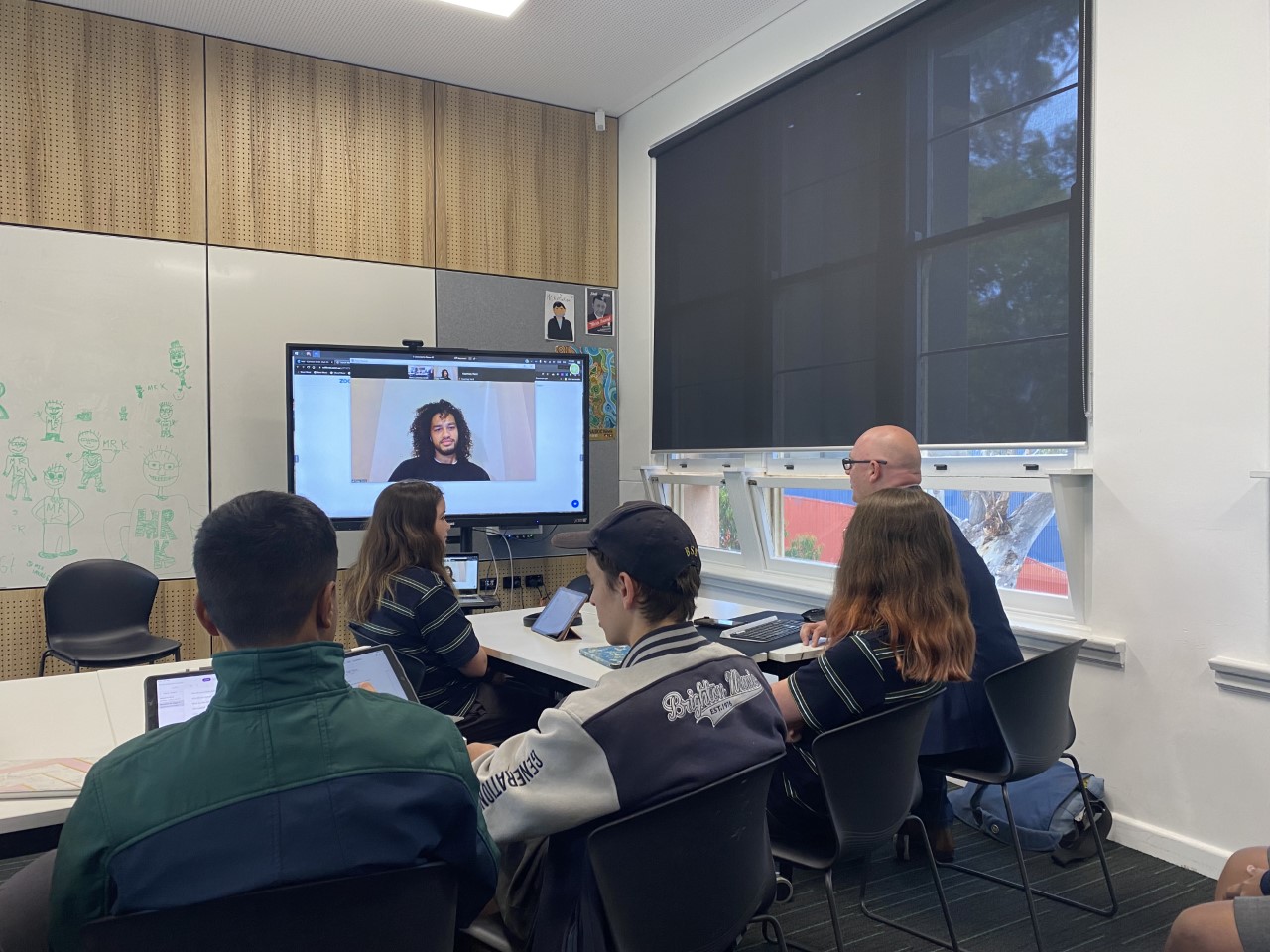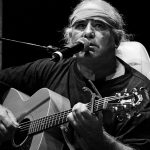From Little Things Big Things Grow
Analysis and Discussion - 1991 and 2021
The purpose of this page is to help share the stories, knowledge and truth behind Kev Carmody and Paul Kelly's 'From Little Things Big Things Grow', and Ziggy Ramo's version, 'Little Things'. We present our findings to you as part of our efforts to reconcile the atrocities in Australia. The content below has been gathered from a wide variety of sources and we have done our best to explain what we have discovered.
The first half of this page discusses the musical elements of From Little Things Big Things Grow. The second half of this page discusses the lyrics of Ziggy Ramo's 2021 version, titled 'Little Things'.
Warning: Aboriginal and Torres Strait Islander viewers are advised that this website may contain images, voices and names of deceased persons.
This page was created in August 2021 by Mark Cameron-Smith and Year 9 students at Brighton Secondary School in South Australia. Throughout the semester we learned to play and sing the songs, and we analysed and discussed the content of the lyrics. We welcome any suggestions or corrections.
The Song's Origin
From Little Things Big Things Grow was written by Kev Carmody and Paul Kelly in December 1990. It tells the story of a Gurindji man who worked as a stockman on the Wave Hill Cattle Station. Vincent Lingiari lead his people as they endured an 8-year long strike from 1966, in response to the terrible wages and working conditions they faced while working for Lord (Samuel) Vestey. It soon became a land rights claim.
Kev Carmody (a Murri man from northern Queensland) was taken from his parents' cattle station under the policy of the Australian Governments' (Federal and State) and religious missions' assimilation policy. After school he later returned to rural work and it was during his meetings with stockmen from the Northern Territory that he learned of the Wave Hill walk-off first hand.
Paul Kelly grew up in Kaurna Country (South Australia) where he started learning the piano at age 10. His older siblings (especially his brother, Martin) played music and played records in the house which introduced him to a variety of popular music. He switched to trumpet in high school looking up to jazz musicians such as Louis Armstrong; he began guitar at aged 18. Soon after finishing high school he moved through a number of other states in Australia while building a career as one of the most successful and respected songwriters/musicians in Australia.
Kev Carmody and Paul Kelly became friends through the music industry and got together one Christmas at a campsite at Lake Wivenhoe. Carmody had the chord progression in his mind for a while. The continuous sequence of four chords made a strong platform for storytelling. Carmody relayed what he knew of the Gurindji story to Kelly and within 2 hours they were "polishing" the song. The song was first released on Paul Kelly's 1991 album, Comedy, and later released on Kev Carmody's 1993 album, Bloodlines. Carmody had held off recording the song in respect for the mourning period after Lingiari’s death.
Elements of Music Analysis
Lyrics - Kev Carmody and Paul Kelly (1991)
Watch on YouTube / Listen on Spotify
From Little Things Big Things Grow
by Kevin Carmody and Paul Kelly
Gather round people, I'll tell you a story
An eight-year long story of power and pride
British Lord Vestey and Vincent Lingiari
Were opposite men on opposite sides
Vestey was fat with money and muscle
Beef was his business, broad was his door
Vincent was lean and spoke very little
He had no bank balance, hard dirt was his floor
From little things big things grow
From little things big things grow
Gurindji were working for nothing but rations
Where once they had gathered the wealth of the land
Daily the pressure got tighter and tighter
Gurindji decided they must make a stand
They picked up their swags and started off walking
At Wattie Creek they sat themselves down
Now it don't sound like much but it sure got tongues talking
Back at the homestead and then in the town
From little things big things grow
From little things big things grow
Vestey man said 'I'll double your wages
Seven quid a week you'll have in your hand'
Vincent said 'Uh-uh we're not talking about wages
We're sitting right here 'til we get our land'
Vestey man roared and Vestey man thundered
'You don't stand the chance of a cinder in snow!'
Vince said 'If we fall others are rising'
From little things big things grow
From little things big things grow
Then Vincent Lingiari boarded an airplane
Landed in Sydney, big city of lights
And daily he went round softly speaking his story
To all kinds of men from all walks of life
And Vincent sat down with big politicians
'This affair,' they told him, 'it's a matter of state
Let us sort it out, while your people are hungry'
Vincent said 'No thanks, we know how to wait'
From little things big things grow
From little things big things grow
Then Vincent Lingiari returned in an airplane
Back to his country once more to sit down
And he told his people 'Let the stars keep on turning
We have friends in the south, in the cities and towns'
Eight years went by, eight long years of waiting
'Til one day a tall stranger appeared in the land
And he came with lawyers and he came with great ceremony
And through Vincent's fingers he poured a handful of sand
From little things big things grow
From little things big things grow
That was the story of Vincent Lingiari
But this is the story of something much more
How power and privilege can not move a people
Who know where they stand and stand in the law
From little things big things grow
From little things big things grow
From little things big things grow
From little things big things grow
(w/ backing vocals)
From little things big things grow
From little things big things grow
From little things big things grow
From little things big things grow
From little things big things grow
From little things big things grow
(backing vocals only)
From little things big things grow
From little things big things grow
Lyrics - Ziggy Ramo (2021)
Watch on YouTube / Listen on Spotify
Little Things (featuring Paul Kelly)
by Ziggy Ramo
Gather 'round, people, and I'll tell you a story
Two hundred years of history that's falsified
British invaders that we remember as heroes
Are you ready to tell the other side?
We start our story in 1493
With a piece of paper called the Doctrine of Discovery
Invoked by Pope Alexander VI
Without this good Christian, our story don't exist
From little things big things grow
From little things big things grow
Captain James Cook, he boarded a fleet
And he was armed with the Doctrine of Discovery
The same tactics were used by Columbus
It's how today Australia claims terra nullius
'Cause on that paper, the Pope did write
That you're only human if you've been saved by Christ
And if there are no Christians in sight
The land you stumble on becomes your God-given right
From little things big things grow
From little things big things grow
Is that your law? Cause that's invasion
That's the destruction of five hundred nations
The genocide of entire populations
Which planted the seeds for the stolen generation
And grew into my people's mass incarceration
Now we pass trauma through many generations
But the lord can't discover what already existed
For two hundred years, my people have resisted
From little things big things grow
From little things big things grow
The wars continued since Captain James Cook
And this side of history, you don't write in your books
You don't want the truth and you don't want to listen
But how can you stomach Australia's contradiction
'Cause we went to war in 1945
We were allies against a terrible genocide
And I know it's uncomfortable but the irony I see
Is that you fought for them, but you don't fight for me
From little things big things grow
From little things big things grow
We should move on. Move on to what?
I still remember, have you forgot?
That Vincent Lingiari knew others were rising
Gurindji inspired us to keep on fighting
So call it Australia, go on call it what you like
I just call it how I see it and I see genocide
Now that you hear me, can you understand?
There will never be justice on our stolen land
From little things big things grow
From little things big things grow
This is the story of so called Australia
But this is the story of so much more
How power and privilege can not move my people
We know where we stand, we stand in our law
From little things big things grow
From little things big things grow
From little things big things grow
From little things big things grow
(w/ backing vocals)
From little things big things grow
From little things big things grow
From little things big things grow
From little things big things grow
From little things big things grow
From little things big things grow
(backing vocals only)
From little things big things grow
From little things big things grow
Since 1991, four hundred and forty-one
Indigenous Australians have died in custody
The casualties of a war that never ended
But we are not yet defeated
Always was, always will be
Sovereignty was never ceded
Analysis of Lyrics
The lyrics of Ziggy Ramo are powerful to say the least. They're uncomfortable. They're supposed to be. The deliberate killing of tens of thousands of people from a collection of nations with the aim of destroying them, should cause a lot more than discomfort. I hope in the following words the students and I can support Ramo's voice and play a part in the truth telling.
When Ziggy filmed the video clip for Little Things, he wore clothes that mimicked those worn by Vincent Lingiari at the handover ceremony on 16 August 1975.
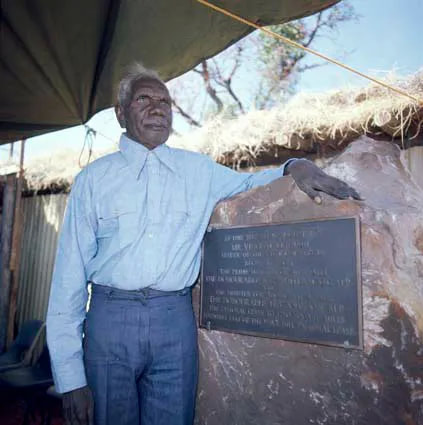
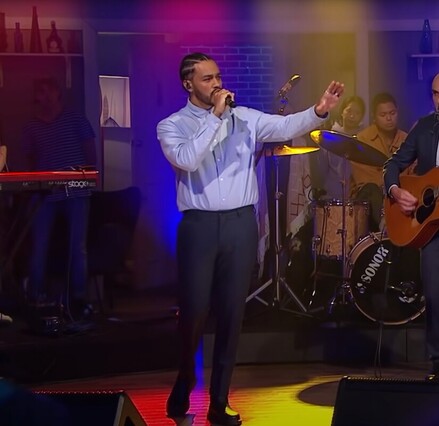
After listening to Ramo's version the students wrote and researched questions relating to the lyrics. These questions formed the basis of our investigation and some of our answers are below.
We took the time to analyse each line of lyrics from Ramo's version and research what we believe to be the meaning behind the powerful lyrics.
"Two hundred years of history that's falsified"
In January 1788 (approximately two hundred years ago) a land where 500 nations had lived for over 65,000 years, was invaded by fleets of Christians from Europe. The history books that we grew up with never told the story from the other side.
What does 200 years look like in context of 65,000 years? Each flag in the graphic below represents 200 years of time.
200 years of European inhabitance ÷ 65,000 years of Aboriginal inhabitance = just 0.003% of time or 1/325th.
Graphic representation created by Mark Cameron-Smith
"British invaders that we remember as heroes"
On 26 January 1788 eleven ships lead by Captain Arthur Phillip sailed into what is now known as Port Jackson on HMS Supply and raised the British flag to proclaim the colony of New South Wales.
History books talk of the leaders of the First Fleet as heroes. It's true that during the 250 days of sailing from Portsmouth, England to Botany Bay, that they would have encountered many obstacles where they were called on to demonstrate heroic attributes. However their actions after that moment of invasion don't seem to be those of heroes.
A hero is defined as a person who is admired for their courage, outstanding achievements, or noble qualities. It's difficult to imagine that people who invade nations demonstrated qualities such as honesty and generosity.
We recognise these 'heroes', using their names in towns and land masses (Ben Boyd National Park, Port Philip, Philip Island, Cook Island), education institutions (Flinders University, Charles Sturt University, Macquarie University, James Cook University), waterways (Cooks River, Darling River), etc.
Captain James Cook
- James Cook was a British naval captain, navigator and explorer who is known to have mapped out the east coast of Australia, paving the way for the spread of the British settlement. His mission in 1770 was to travel the Tahiti to observe Venus moving across the face of the Sun. Once he arrived, he received orders to take possession of the new land in the name of the King of Great Britain. Cook raised the British flag on August 22nd 1770, beginning the British colonisation.
Captain Arthur Phillip
- Captain Arthur Phillip was the commander of the First Fleet who was a British hero known to lead the first permanent European colony on the Australian continent. Phillip hoped to learn the local language, gain information about food and water sources and understand their culture by kidnapping some Aboriginal men.
Christopher Columbus
- Christopher Columbus was not British but was an Italian explorer and navigator known to open the way for the widespread European exploration. He is seen as a hero and so called 'discoverer' of the 'New World'. Columbus lead the European invasion of the Americas. The impact of his voyages to the Americas included the death of many Aboriginal people due to murder and disease. This also lead to the displacement and enslavement of many Aboriginal people.
Ben Boyd
- Boyd is considered Australia's first 'blackbirder', the name given to operators who shipped South Sea Islanders to the colonies and paid minimal wages to evade anti-slavery laws. The name of the park has long sparked controversy, particularly among the local Aboriginal community, who have called for it to be changed due to Boyd's links to 'blackbirding.' Source ABC News
In 2001 the Australian electoral division created the Division of Lingiari (named after Vincent Lingiari), which includes the city of Darwin.
"Are you ready to tell the other side?"
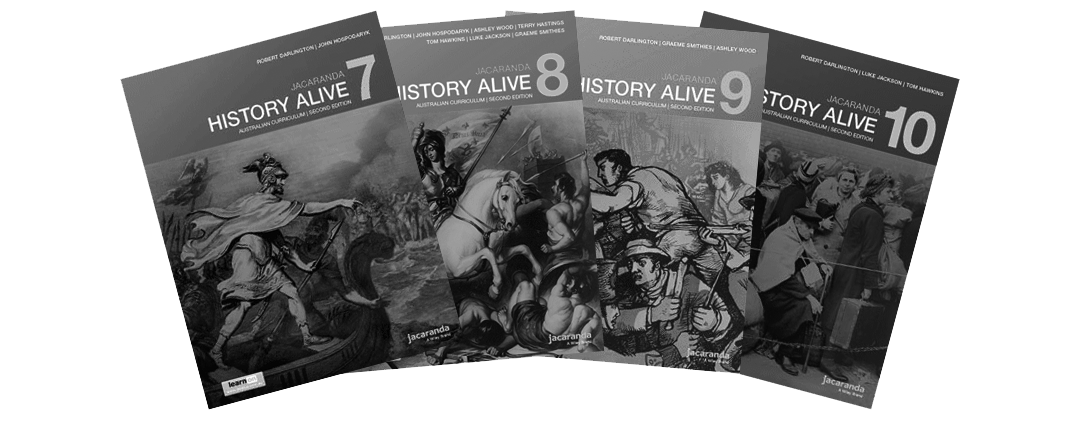
Sadly, so-called history books are still well behind where they should be in terms of even a basic recognition of Aboriginal culture before British colonisation. For example, the Jacaranda History Alive Australian Curriculum series of books (published in 2017) are used widely to teach History throughout Australian schools. The content of the series of books designed for years 7 through 10, is detailed in the section below. The only mention of Australia in the content of four volumes of a best-selling brand of books, begins from the time of British colonisation in the Year 9 topics and continued in Year 10.
Furthermore, this is no mention of the killing and abuse that took place since the British invasion. If change is going to happen, History books, especially school books, need to tell the other side.
- Year 7 topics: Historians, archaeologists and the ancient past, Investigating an ancient mystery: the Olmec, The ancient past before farming, The ancient past since farming, Ancient Egypt, Ancient Greece, Ancient Rome, Ancient China, Ancient India
- Year 8 topics: A world in change (c. 650–1400), A world of expanding contacts (c.1400–1750), The Vikings (c. 790–1066), Medieval Europe (c. 590–1500), The Ottoman Empire (c. 1299–1683), Renaissance Italy (c. 1400–1600), Angkor and the Khmer Empire (c. 802–1413), Japan under the shoguns (c. 794–1867), Polynesian expansion across the Pacific (c. 700–1756), Mongol expansion (c. 1206–1368), The Black Death – a 14th century plague, The Spanish conquest of the Americas (c. 1492–1572)
- Year 9 topics: The modern world and Australia (1750-1918), The Industrial Revolution (1750-1914): (I) Technology and progress, The Industrial Revolution (1750–1914): (II) The impact on people, Movement of peoples (1750-1901), Making a nation — Australia (1750–1918): (I) Colonisation and conflict, Making a nation: (II) From colonies to nationhood, Asia and the world: China (1750–1918), World War I (1914-1918)
- Year 10 topics: The modern world and Australia (1918-1939), World War II (1939-1945), The modern world and Australia since World War II, Rights and freedoms (1945-present), Popular culture (1945-present), The environment movement (1960s-present), Migration experiences (1945-present)
"We start our story in 1493 with a piece of paper called the Doctrine of Discovery"
The 1493 Papal decree aimed to promote Christian domination and superiority in the world, by justifying Christian European explorers' claims on land and waterways they allegedly discovered.The 'Doctrine of Discovery' essentially ignored any other nation's cultural traditions or beliefs and gave the Christian explorers a passport to conquer and enslave the original inhabitants of the land.
"The same tactics were used by Columbus"
Christopher Columbus (an Italian explorer) arrived in Americas in 1492. Historians believe that the Americas were occupied by 100 million indigenous peoples at the time - approximately one fifth of the human race on the planet at that time. However as they were not Christians, hence the land of the Americas was ruled terra nullius.
"It's how today Australia claims terra nullius"
"That you're only human if you've been saved by ChristAnd if there are no Christians in sightThe land you stumble on becomes your God-given right"
"Is that your law? Cause that's invasionThat's the destruction of five hundred nations"
"The genocide of entire populations"
"Which planted the seeds for the stolen generation"
The stolen generation is a period in Australia’s history when Aboriginal children were taken from their families and their homes. They were taken to non-aboriginal foster families and treated abysmally, being abused physically and verbally. The aim of the stolen generation was to take the Aboriginal children away from their families so they could be educated by ‘white’ culture and the Aboriginal culture would disappear.
Further reading: https://australianstogether.org.au/discover/australian-history/stolen-generations
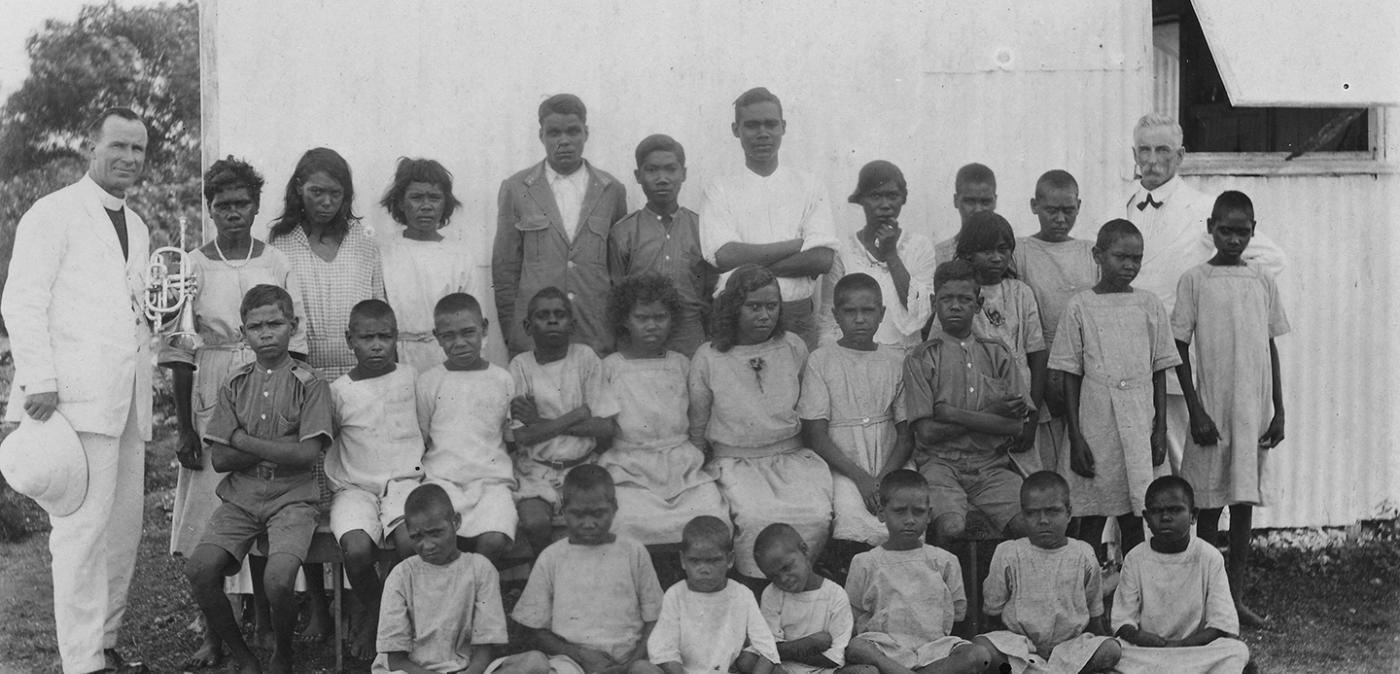
"'Cause we went to war in 1945"
Aboriginal soldiers fought alongside white Europeans and Australians in many international conflicts, including World War II (8,000 Aboriginal soldiers served between 1939-1945). Upon returning from duty they were largely ignored and were not allowed in RSL clubs or supported (financially or mentally) as they dealt with the trauma of war. Their families were never supported by Legacy. On top of that a lot of them found that their families had been broken up as part of the stolen generations policies.
The Aboriginal soldiers still had a warrior ethic and they were protecting their country - fighting for their nations.
Further reading: https://www.awm.gov.au/articles/blog/the-fighting-gunditjmara
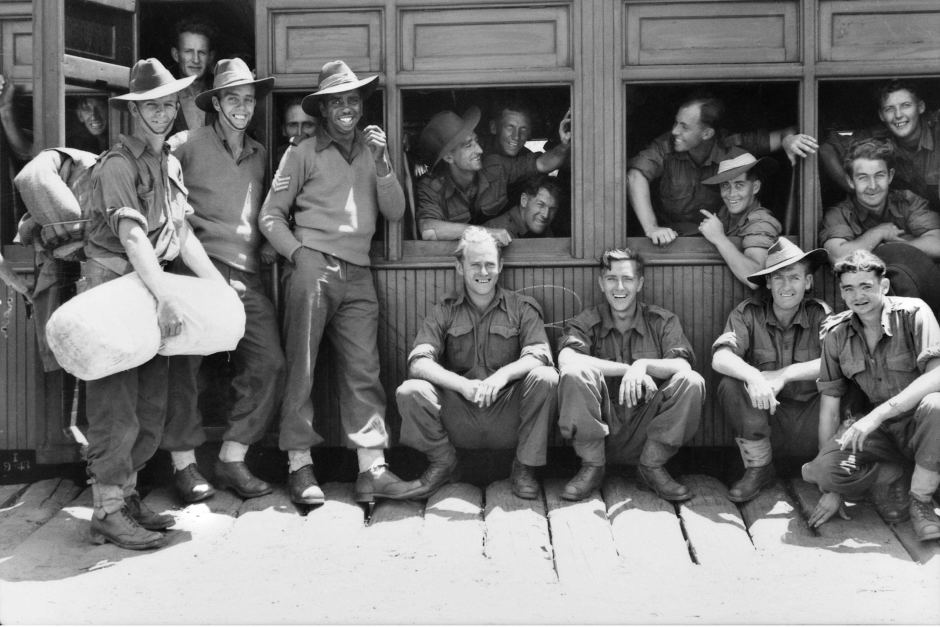
Gunditjmara man Reg Saunders surrounded by his mates of the 2/7th Battalion, in 1943.
"I know it’s uncomfortable"
This is true because our current nation hasn’t really been taught the truth. It is uncomfortable to know that non-Aboriginal ancestors of the country you live in killed thousands of people for their own ‘new’ land.
"You fought for them but you didn’t fight for me"
"We should move on. Move on to what?"
"...a lot's changed since then (the Aboriginal Tent Embassy's establishment in 1972), and I think it probably is time to move on from that."
Tony Abbott, 2012
Those comments sparked protests and riots. To 'move on' from something means to put that issue aside and proceed. To use this phrase seems to imply that 'we' should dismiss the issues and legacy the Aboriginal Tent Embassy stood for, and continue as if it never existed; sadly, something that goes to the heart of the matter.
Abbott preceded his comments above by citing Kevin Rudd's "historic apology", and "the proposal...to recognise Aboriginal people in The Constitution", as things that Aboriginal people can be proud of, and that "every Australian" respect them for those two achievements.
Further reading: https://www.smh.com.au/politics/federal/why-abbotts-tent-embassy-comments-were-wrong-20120201-1qssk.html
"There will never be justice on our stolen land"
Justice is often symbolised by a balanced set of scales implying that justice is when things are equal. Given all the lives, languages, lore and cultures, and land that has been destroyed or unlawfully taken, it is not conceivable that justice could ever occur.
The rights of native title held by Aboriginal people before European invasion were ignored for hundreds of years. In 'recent' times two High Court cases: Mabo (1992) and Wik (1996) recognised common law rights of native title. However Aboriginal claiming land rights 'face a miasma of complex legal and political issues, competing demands, a lack of resources, and a great deal of uncertainty' (Bauman 2013). In other words without masses of people getting behind them, Aboriginal face an almost insurmountable task to achieve balance.
"Since 1991, four hundred and forty-one Indigenous Australians have died in custody"
To understand what it means to die in custody, we must understand the significance of it and what it defines itself as. From the moment Europeans set foot on land they didn’t think twice about how we need to respect the elders of this sacred land.
From 1991, there has been over 441 total deaths concerning Aboriginal people 45+ of which located here in South Australia.
Through generations, the well-being of Aboriginal people has been severely abused and unreported. Among other human rights abuses, studies show that most Aboriginal deaths in custody are due to inadequate medical care, lack of attention (from the Governments) and self harm. The Guardian News and Media's database states Aboriginal people are 3 times less likely to receive medical care than others. Therefore, increasing the overall death rate in custody. Even though much is not taken under consideration concerning this problem, many foundations, such as the AIC, work to improve care provided by police and corrective services.
"Always was, always will be"
The phrase originated during the 1980s Barkandji peoples' land rights movement in far-western New South Wales during their fight for legal recognition and rights as sovereign owners of their homelands. Since that time it has become "a belief, a chant, and a fundamental understanding about the truth of Australia" (Mundine, 2020).
In simple terms the phrase recognises that the Aboriginal people were the first inhabitants of these lands, and that this will always be the case.
"Sovereignty was never ceded"
If someone in a position of authority cedes land or power to someone else, they surrender the land or power, often as a result of military or political pressure.
Aboriginal people still have right to this land; it was their land from the beginning. Sovereignty was never ceded means that they never gave up ownership over the land, sea and air. To this day they have the right to have supreme authority over the land and in the future they have the right to always rule over it.
Meeting with Ziggy
Shortly after this web page went live, the students participated in a video meeting with Ziggy where he expressed his gratitude for the analysis and answered students' questions regarding music and culture.
